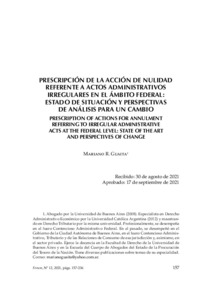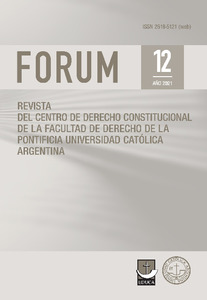Please use this identifier to cite or link to this item:
https://repositorio.uca.edu.ar/handle/123456789/13249| Título: | Prescripción de la acción de nulidad referente a actos administrativos irregulares en el ámbito federal : estado de situación y perspectivas de análisis para un cambio Prescription of actions for annulment referring to irregular administrative acts at the federal level : state of the art and perspectives of change |
Autor: | Guaita, Mariano R. | Palabras clave: | ACTOS ADMINISTRATIVOS; NULIDAD; INTERPRETACION DE LA LEY; DERECHO PUBLICO; DERECHO CIVIL | Fecha de publicación: | 2021 | Editorial: | Pontificia Universidad Católica Argentina. Facultad de Derecho. Centro de Derecho Constitucional | Cita: | Guaita, M. R. Prescripción de la acción de nulidad referente a actos administrativos irregulares en el ámbito federal : estado de situación y perspectivas de análisis para un cambio [en línea]. Forum. Revista del Centro de Derecho Constitucional de la Facultad de Derecho de la Pontificia Universidad Católica Argentina. 2021, 12. Disponible en: https://repositorio.uca.edu.ar/handle/123456789/13249 | Resumen: | Resumen: La prescripción de la acción de la Administración Pública para revisar,
revocar, modificar o sustituir los actos que ella misma dicta no
reconoce una regulación expresa en el ordenamiento jurídico positivo.
La búsqueda de una definición al respecto se encuentra interferida
por una infinidad de otros problemas hermenéuticos de equiparable
complejidad y trascendencia.
La solución predominante acerca de si el carácter prescriptible
de aquella acción puede tener cabida cuando está referida a un acto
administrativo afectado de nulidad absoluta y, en su caso, acerca del
plazo de esa prescripción, procede principalmente de antiguos fallos
de la Corte Suprema de Justicia de la Nación. Se extrae de ellos la
afirmación contundente en cuanto a que una acción de esa clase no
puede prescribir.
Como ha advertido una parte considerable de la doctrina de los
autores, los fundamentos en los cuales reposa aquella conclusión son
de difícil conciliación con las normas positivas más afines a la cuestión
y con la jurisprudencia del propio tribunal relativa, por un lado,
a las reglas de uso corriente para la interpretación de la ley –tanto
generales como específicas del Derecho Público– y, por otro, a la función
social que cumple la prescripción, inclusive en causas en las que
el Estado es parte. La solidez y el poder convictivo de las opiniones
vertidas en sentido contrario a la jurisprudencia prevaleciente hacen
suponer que la solución dada por la Corte a esta encrucijada obedeció
a razones que trascienden lo estrictamente jurídico.
Aunque cambios legislativos y jurisprudenciales recientes parecieran
renovar la fuerza de aquella solución especialmente amparada
en el Derecho Civil, se mantiene el interrogante acerca de si la misma
puede ser trasladada sin más al campo de acción de la potestad revocatoria
de la Administración Pública o, en todo caso, si resulta ello
conveniente. Abstract: Statute of limitations related to the public administration’s prerogative of reviewing, reversing, modifying or substituting administrative decisions from the past are not expressly set forth in the law. Finding a solution on this matter requires previous consideration of several issues regarding the interpretation of the law, all of which show similar complexity and relevance. In particular, the question about whether any statute of limitations may apply to this prerogative with respect to prior administrative decisions that are invalid on absolute grounds, and if so, what is the term of that statutory limitation, has been answered by the National Supreme Court of Justice in old judiciary decisions, by compellingly establishing that no limitation period proceeds over that kind of legal action. Scholars have claimed that the fundamentals of such conclusion are of difficult conciliation with the lawful regulations on the matter, and even with the stare decisis within the Supreme Court itself, concerning, on one hand, common legal practice in the process of interpreting the law –general law just as much as those particularly referred to administrative law– and, on the other, with the social relevance of statutory limitation, including those controversies involving the state as a party. The robustness and persuasive potential of the Supreme Court’s approach contrary to the prevailing judgments allows one to wonder whether the rationales of no legal timeframe was sought by the Court for reasons beyond those strictly legal. Although recent legislative reforms and changes in the case law had occurred on this particular field –reinforcing and confirming that Supreme Court’s traditional view mainly sustained in the private law–, the doubt on the possibility –or even the convenience– of applying that legal doctrine when ruling on cases concerning the public administration’s reversing prerogative remains open. |
URI: | https://repositorio.uca.edu.ar/handle/123456789/13249 | ISSN: | 2718-6628 (en línea) | Disciplina: | DERECHO | Derechos: | Acceso abierto | Fuente: | Forum. Revista del Centro de Derecho Constitucional de la Facultad de Derecho de la Pontificia Universidad Católica Argentina. 2021, 12 |
| Appears in Collections: | FOR - 2021 nro. 12 |
Files in This Item:
| File | Description | Size | Format | |
|---|---|---|---|---|
| prescripción-accion-nulidad.pdf | 444,55 kB | Adobe PDF |  View/Open | |
| portada.pdf | 692,71 kB | Adobe PDF |  View/Open |
Page view(s)
260
checked on Apr 27, 2024
Download(s)
3,394
checked on Apr 27, 2024
Google ScholarTM
Check
This item is licensed under a Creative Commons License

